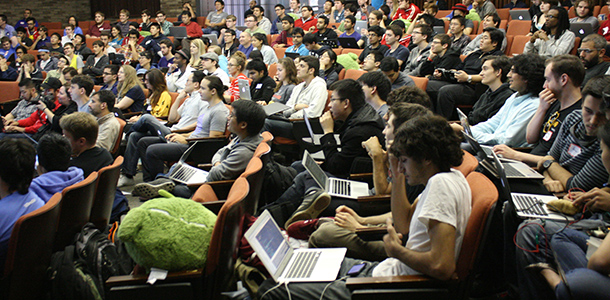
(Photo Credit: Matylda Czarnecka/Wikimedia)
Several of the fastest growing jobs in California did not even exist ten years ago. In 2005, no one had the titles of Mobile Applications Developer, Social Media Manager or Data Science Analyst. Today, these jobs are growing quickly, they’re popular and they pay well.
What happened? Technology happened, and we need come to grips with the reality that new technologies and new skill requirements are demanding new ways to prepare our future workforce. By 2025, 65 percent of all job openings in California will require some form of postsecondary education, according to Dr. Anthony Carnevale, director of the Georgetown University Center on Education and the Workforce. California — of all states – should be leading the nation on delivering this, but unfortunately, we’re not keeping up.
The California Community Colleges Board of Governors concurs. In November 2015, it unanimously adopted 25 ‘Strong Workforce’ recommendations. These recommendations came from a statewide, year-long state wide task force on Workforce, Job Creation and a Strong Economy. The recommendations would help community colleges better deliver on the need for 1 million more industry valued middle-skill credentials. In particular, the Board of Governors emphasized one fundamental point: we must do a better job of teaching students the skills they need to win the jobs of the future. To do that, we need to do three things.
First, we must identify the careers of the future. Thanks to the great work of the Silicon Valley Leadership Group, the Bay Area Council, Orange County Business Council, Fresno Business Council, LA Area Chamber, and other smart business alliances, we have an increasingly clearer picture of where the next big areas of job growth will occur. Over the next ten years, for example, California will see tens of thousands of new jobs in occupations like health informatics and home health care, mobile development and user interface design, and data mining and virtualization.
Second, industry and education must collaborate to prepare people to win these jobs. We need to place labor market needs at the forefront of curriculum and career pathway development. We should ensure all stakeholders are at the table – community college faculty, business and industry representatives, labor and other regional workforce development partners – to design college career technical education programs. This way, industry can tell educators the skills it seeks and educators must teach students those skills. Cisco and other companies have shown us the way by identifying skills of the future, creating their own certifications, and sharing them with community colleges. Thanks to this work, we know we need, for example, greater exposure at the K-12 level to science, technology, engineering and mathematics (STEM). We need more robust, symbiotic relationships between industry and education to provide the most effective, tailored education for our students.
Third, we need to empower our educators to modernize curricula to respond to changing labor market needs. On the community college front, it currently takes far too long to approve updated curricula, leaving employers without the skilled workers they need and Californians without current skills to get good jobs. With this mismatch, our economy stalls, and structural unemployment grows. We must streamline the curriculum approval process so we can deliver skills to students at the speed of business, rather than the speed of government bureaucracy. And we should make curriculum approved at one college available for use by faculty at other colleges without undue repetitive process.
Finally, community colleges need more flexible ways to bring industry experience into the classroom. Especially in emergent industries, like drones and Hadoop software programming, those best suited to teach the content come from the field rather than academia.
California is the world’s epicenter of entrepreneurship and innovation. We are uniquely positioned to win the jobs of the future. To do it, we need to bring education and industry together to empower the next generation of Californians with the skills they need to thrive in the 21st century. We urge California employers and the Academic Senate to move swiftly to implement the Board of Governors’ recommendations.
Steve Westly is founder The Westly Group and previously served as the controller and chief fiscal officer of the state of California.
Jack Scott served as Chancellor of the California Community Colleges system during 2009-2012. Under his leadership, the Student Success Scorecard was implemented applicable to all 113 community colleges.

